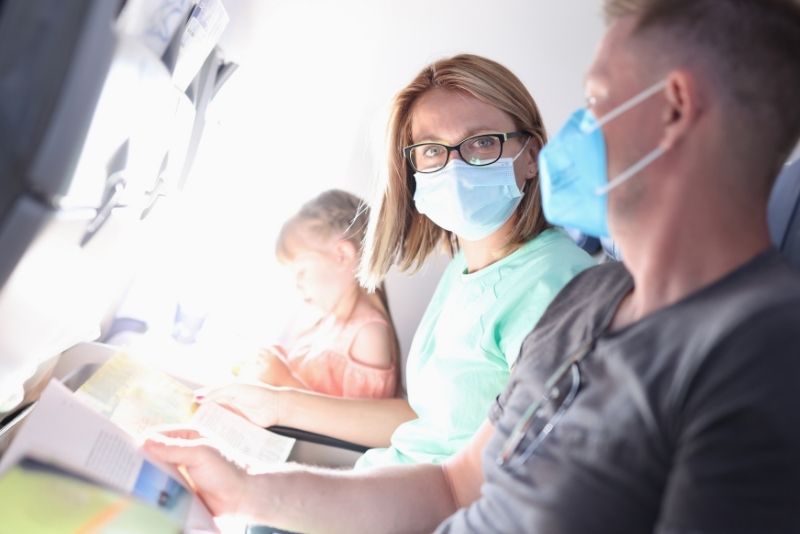The new travel rules from February 2022

Many of us are starting to plan our escape to sunnier climes, that elusive short break that has been moved forward endless times due to lockdowns, restrictions, COVID passports, passenger locators, confusion… so what is the latest news?
The good news is that the UK is set to ease restriction for all fully-vaccinated travellers returning from abroad from 11th February 2022.
Latest COVID travel rules
From 4am on the 11th February, travellers will no longer need to take a Day 2 PCR test when returning to the UK, good news for the industry – and our wallets.
For those who are still unvaccinated, from 11th February they will need to take a pre-departure test before travelling to the UK, and a Day 2 PCR test on arrival.
However, it’s important to note that despite these changes, all travellers entering or returning to the UK will still need to complete a passenger locator form within 48 hours of arriving in the UK.
While the UK is easing restrictions, the WHO has called on other countries to lift their international travel bans, stating that they “continue to contribute to the economic and social stress”, with the traveller bearing the brunt of it. And due to the unequal distribution of vaccines, they have advised that proof of vaccine should no longer be required.
With things as fluid as ever, as of Jan 27, 58 countries had completely restricted entry to non-citizens and 166 were open but require quarantine and/or a negative COVID test. While many countries are unlikely to compromise any time soon, it does feel as though our travel freedoms are very slowly being restored, and the WHO is supportive of that.
Paul Giffiths, A-Plan Farnham’s travel insurance expert has over 15 years’ experience in the field. And thankfully, he is on hand to help guide us through the latest changes:
UK travel updates
“It has certainly been a challenge to keep on top of the governments travel rules. It’s also important to note that as well as changes in the UK, other countries have changing requirements as well – and these can quite literally change overnight.
“If you are planning to travel would advise checking the governments travel advice website to keep up with the latest updates.
“To add to the ongoing confusion, travel insurance costs have risen which has been a shock to many, particularly those who travelled more frequently prior to COVID. It’s worth outlining that the price increases aren’t solely related to COVID, there are a number of additional factors, including increased age for those comparing insurance to a couple of years ago. The UK has left the EU, the Financial Conduct Authority has changed how travel insurers manage medical screening and there is now a reduced market as many insurers have chosen to withdraw from the market!”
COVID has changed travel insurance!
“We have seen huge changes in the travel insurance market – initially many insurers withdrew cover for pandemic risks, but over time, we have seen insurers slowly introduce more COVID cover.
“The biggest exclusion now is that some insurers will not provide cover if the Foreign, Commonwealth and Development Office, or any Government, puts travel restrictions in place due to the pandemic.
“It’s also worth mentioning that we are seeing some insurers withdraw cover if the traveller is unvaccinated, particularly with insurers that do cover someone having to self-isolate abroad – and the increased risk and costs that would go with that if the person is unvaccinated. And, although the COVID vaccine is ‘new’ to us, vaccination status has always been an important criteria when it comes to travel insurance, for example, prior to the COVID vaccine, travellers regularly had to confirm that they had been vaccinated against hepatitis, malaria or yellow fever, to mention a few.
“We also now have an insurer that will provide cover to travel to a European country against FCDO advice, where the only reason they advise not to travel is for COVID, however you will still need to be vaccinated.”
Does travel insurance cover COVID?
“Some insurers would cover certain scenarios, so it would be a case of matching the traveller’s expectations with the right insurer, and ascertaining their vaccination status.
“If you enter a country which then goes into lockdown, you are bound by the laws of that country. The good news is that, if it means you are delayed in coming home, the policy will extend to cover you until your return, as long as you return as soon as possible.

“If a traveller tests positive prior to leaving, it depends on when they tested positive, or whether they have been hospitalised due to COVID. Some insurers will cover you if you have tested positive via a PCR test in the 14 days prior to departing, or hospitalised up to 28 days prior to departing.
“In most cases, tour operators will know about any lockdowns in advance, get in touch and fly you home before it comes into effect.”
Questions? Just ask.
With things changing all the time, we understand that you may want to ask our travel insurance experts questions, and would encourage you to give your local branch a call. You can find your local branch here.







